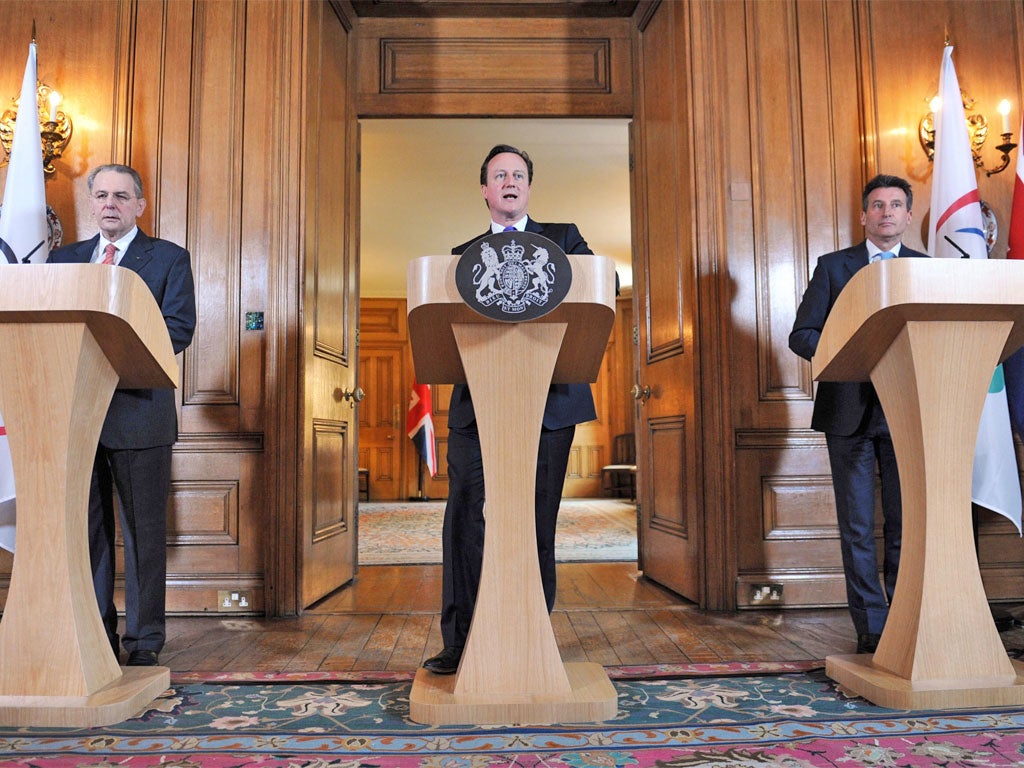Public still slow to warm to this summer's Olympics
More than half of those polled think that spending £9.3bn on the 2012 Games is not good value for taxpayers' money

Your support helps us to tell the story
From reproductive rights to climate change to Big Tech, The Independent is on the ground when the story is developing. Whether it's investigating the financials of Elon Musk's pro-Trump PAC or producing our latest documentary, 'The A Word', which shines a light on the American women fighting for reproductive rights, we know how important it is to parse out the facts from the messaging.
At such a critical moment in US history, we need reporters on the ground. Your donation allows us to keep sending journalists to speak to both sides of the story.
The Independent is trusted by Americans across the entire political spectrum. And unlike many other quality news outlets, we choose not to lock Americans out of our reporting and analysis with paywalls. We believe quality journalism should be available to everyone, paid for by those who can afford it.
Your support makes all the difference.More than half the public thinks the London Olympics will not be worth the taxpayers' money that has been spent on them, according to a survey for The Independent. The ComRes poll found that 51 per cent of people disagree with the statement that the Games will be worth the £9.3bn cost to the public purse; 40 per cent agree with the statement and 9 per cent replied "don't know." Young people are much more relaxed about the cost of the event than other age groups: 58 per cent of those aged 18 to 24 believe the Games will be worth the money, compared with 32 per cent of those aged 35 to 44. Opinions also appear to divide according to social class.
More people in the top AB group (49 per cent) think the cost is justified than do not (42 per cent). But the opposite is the case among other social classes, suggesting that the Olympics could be seen as a "rich person's event".
Scots are the most sceptical about the bill for taxpayers: two-thirds do not believe the Games are worth it. Even in the South-east, including London, only 40 per cent of people think the event will be worth the money being spent, against 51 per cent who disagree.
Liberal Democrat supporters are happier about the cost than those who intend to vote for other parties. A majority of the party's supporters (58 per cent) think the Games will be worth it, compared with 42 per cent, both for Conservative and for Labour supporters.
The findings suggest the bill for taxpayers could become a headache for the Government. Yesterday David Cameron dismissed suggestions that the money would be better spent on social projects for young people, to prevent a repeat of last summer's riots.
He insisted that the cost of the Olympics could be justified because they could inspire Britain's young people and "have the power to change people's lives". He added: "Every government has to be very careful with public money. We have been with this budget. I am proud of the fact that we are coming in on time and on budget."
The Prime Minister met inspectors from the International Olympics Committee (IOC) on their final inspection visit before the Games.
Promising "the greatest show on earth", Mr Cameron said: "The Olympics will revitalise local sport in Britain for generations to come." On the use of Olympic venues after the Games, he added: "I think it is time to tear up any notion of the Olympics leaving behind white elephants."
Jacques Rogge, the IOC president, who held a joint press conference in Downing Street with Mr Cameron, said: "London has raised the bar on how to deliver a lasting legacy. We can already see tangible results in the remarkable regeneration of east London. This great, historical city has created a legacy blueprint for future Games hosts."
Jeremy Hunt, the Culture, Media and Sport Secretary, said the Government was determined to make the Games "the first true legacy Olympics". He said: "We can't guarantee this, but we're hoping this will be the first Olympics where all the major sports venues have a legacy use secured before the actual Games start. That will be a major first and a big achievement for London."
ComRes interviewed 1,000 adults by telephone between 23 and 26 March. Data was weighted to be demographically representative of all British adults and also weighted by past vote recall. ComRes is a member of the British Polling Council and abides by its rules. Full tables at www.comres.co.uk.
Subscribe to Independent Premium to bookmark this article
Want to bookmark your favourite articles and stories to read or reference later? Start your Independent Premium subscription today.
Join our commenting forum
Join thought-provoking conversations, follow other Independent readers and see their replies
Comments